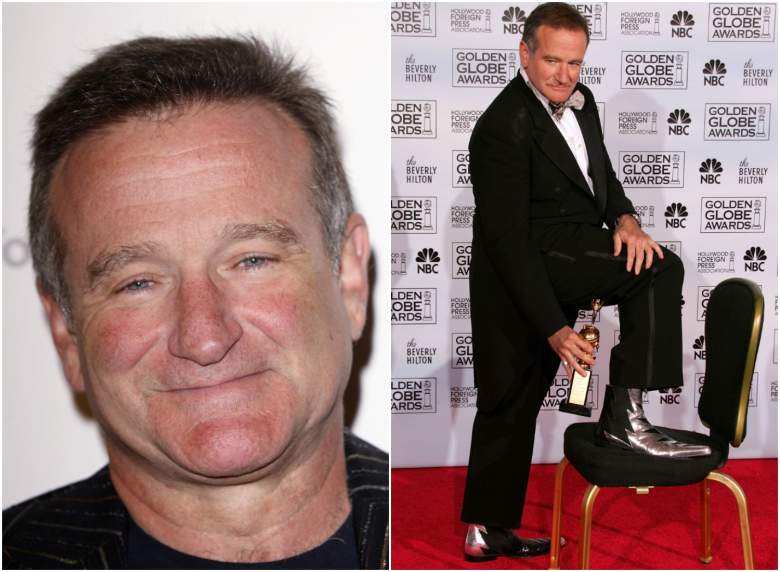
Getty Actor Robin Williams attends the Second Annual Christopher Reeve Foundation Celebration at the Beverly Hilton Hotel on September 27, 2006 in Beverly Hills, California./Actor Robin Williams poses with his Cecil B. DeMille Award backstage during the 62nd Annual Golden Globe Awards at the Beverly Hilton Hotel January 16, 2005 in Beverly Hills, California.
Robin Williams died on August 11, 2014, at age 63 by suicide, according to a coroner’s report released after his death. His autopsy revealed that he was suffering from a neurological disorder, Lewy body dementia. You can read the full autopsy report here.
Williams was a beloved comedian and actor whose work spanned genres. He artfully played dramatic leads in films including “Dead Poets Society” and “Good Will Hunting,” melded comedy and drama in “Patch Adams” and “Mrs. Doubtfire,” and captured a generation as “Genie” on the Disney cartoon, “Aladdin.”
ABC’s Superstar: Robin Williams is taking a look at his life, career and personal struggles in its new episode tonight. The one-hour specials airs at 10 p.m. Eastern time Wednesday, October 20, 2021, and it will be available for streaming on Hulu the next day.
Here’s what you need to know:
The Coroner’s Report Filed After Robin Williams’ Autopsy Said He Had ‘Diffuse Lewy Body Dementia’ That Had Been Mistaken for Parkinson’s Disease
The coroner’s report filed after Robin Williams’ death said that he was found dead in his home, and listed his cause of death as asphyxia by hanging, and the manner of death as suicide. The 35-page report said Williams was suffering from “a recent increase in paranoia” based on information from his wife, Susan Schneider Williams.
She told officials her husband had been experiencing severe insomnia and anxiety, so he had been sleeping in a separate bedroom. She woke up the morning after his death and assumed he was still sleeping, then left to run some errands. She became concerned and slipped a note under the door asking if he was OK. The report redacts a name, saying that person used a paperclip to get into the locked bedroom and found Robin Williams unresponsive.
Interviews with Schneider Williams and another person, whose name was redacted, were summarized in the report and said he “suffered sporadically from depression for most of his adult life.” Although he had a past history of drug and alcohol abuse, he had been sober for eight years, the interviews indicated. Schneider Williams said her husband had never expressed suicidal thoughts to her, according to the report.
The autopsy indicated that Robin Williams’ brain showed “diffuse Lewy body dementia,” the final pathological diagnosis filed in the report said. The report noted that Lewy body dementia can often be mistaken for Parkinson’s disease because it also causes motor symptoms characteristic of Parkinson’s disease.
Schneider Williams Created a Documentary, ‘Robin’s Wish,’ to Educate the Public About Lewy Body Dementia & Clear Up Rumors About His Suicide
Schneider Williams created “Robin’s Wish,” a documentary released in 2020, to advocate for her husband after his death and to educate the public about Lewy Body dementia, or LBD, she told the Guardian. He had been misdiagnosed with Parkinson’s disease, but he was also dealing with paranoia and other affects that could not be explained by the diagnosis, she told the news outlet. It wasn’t until his autopsy that his diagnosis became clear.
“The doctors said to me after the autopsy: ‘Are you surprised that your husband had Lewy bodies throughout his entire brain and brain stem?’ I didn’t even know what Lewy bodies were, but I said: ‘No, I’m not surprised.’ The fact that something had infiltrated every part of my husband’s brain? That made perfect sense,” Schneider Williams told the Guardian.
Experts told the Guardian it is not possible to make a direct correlation between LBD and Williams’ suicide, saying that people can lead a productive life with the proper treatment. However, Robin Williams never got that treatment, Schneider Williams told the Guardian. He died by suicide one week before they were scheduled to go to a neurocognitive testing facility, she told the Guardian.
“I think he didn’t want to go. I think he thought: ‘I’m going to get locked up and never come out,” she told the Guardian.
READ NEXT: Zak, Cody & Zelda Williams, Robin William’s Children: 5 Fast Facts You Need to Know
